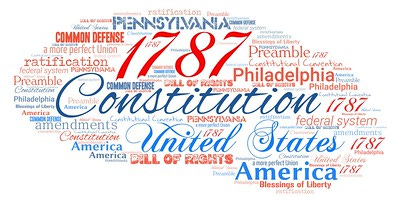#53: CIVICS 101: The Legislative Branch
Q&A #53: What are the powers of Congress as provided in the Constitution?
Our American Government
Our American Government is a small book published by the House of Representatives for citizens and those who seek a greater understanding of the American interpretation of democracy. It follows a question-and-answer format and covers a broad range of topics dealing with the three branches of our Government, the electoral process, and the role of political parties.
The Savvy Citizen is reproducing the 169 questions-and-answers through a series of posts called Civics 101. Each post will contain the Q&A as well as some additional commentary to add historical context, fun facts, or anything we believe will add to our collective understanding of these topics.
Think of it as your adult Civics class but without the test!
Let’s keep at it.
SECTION: The Legislative Branch: The Congress
Congressional Process and Powers
Q&A #53: What are the powers of Congress as provided in the Constitution?
The Constitution (Article 1, Section 8) empowers Congress to levy taxes, collect revenue, pay debts, and provide for the general welfare; borrow money; regulate interstate and foreign commerce; establish uniform rules of naturalization and bankruptcy; coin money and regulate its value; punish counterfeiters; establish a postal system; enact patent and copyright laws; establish Federal courts inferior to the Supreme Court; declare war; provide for the armed forces; impeach and try Federal officers (Sections 2 and 3); and have exclusive legislative power over the District of Columbia.
In Article II, Section 2, the Senate is given the power to consent to the ratification of treaties and confirm the nomination of public officials. Congress is also given the power to enact such laws as may be ‘‘necessary and proper’’ to implement its mandate in Article I. The power to enact laws is also contained in certain amendments to the Constitution.
My Thoughts
The Senate has been exercising its Article 2, Section 2 powers during the cabinet confirmation process.
For your convenience, here’s the text of Article I, Section 8:
Section. 8.
The Congress shall have Power To lay and collect Taxes, Duties, Imposts and Excises, to pay the Debts and provide for the common Defence and general Welfare of the United States; but all Duties, Imposts and Excises shall be uniform throughout the United States;
To borrow Money on the credit of the United States;
To regulate Commerce with foreign Nations, and among the several States, and with the Indian Tribes;
To establish an uniform Rule of Naturalization, and uniform Laws on the subject of Bankruptcies throughout the United States;
To coin Money, regulate the Value thereof, and of foreign Coin, and fix the Standard of Weights and Measures;
To provide for the Punishment of counterfeiting the Securities and current Coin of the United States;
To establish Post Offices and post Roads;
To promote the Progress of Science and useful Arts, by securing for limited Times to Authors and Inventors the exclusive Right to their respective Writings and Discoveries;
To constitute Tribunals inferior to the supreme Court;
To define and punish Piracies and Felonies committed on the high Seas, and Offences against the Law of Nations;
To declare War, grant Letters of Marque and Reprisal, and make Rules concerning Captures on Land and Water;
To raise and support Armies, but no Appropriation of Money to that Use shall be for a longer Term than two Years;
To provide and maintain a Navy;
To make Rules for the Government and Regulation of the land and naval Forces;
To provide for calling forth the Militia to execute the Laws of the Union, suppress Insurrections and repel Invasions;
To provide for organizing, arming, and disciplining, the Militia, and for governing such Part of them as may be employed in the Service of the United States, reserving to the States respectively, the Appointment of the Officers, and the Authority of training the Militia according to the discipline prescribed by Congress;
To exercise exclusive Legislation in all Cases whatsoever, over such District (not exceeding ten Miles square) as may, by Cession of particular States, and the Acceptance of Congress, become the Seat of the Government of the United States, and to exercise like Authority over all Places purchased by the Consent of the Legislature of the State in which the Same shall be, for the Erection of Forts, Magazines, Arsenals, dock-Yards, and other needful Buildings;—And
To make all Laws which shall be necessary and proper for carrying into Execution the foregoing Powers, and all other Powers vested by this Constitution in the Government of the United States, or in any Department or Officer thereof.
—
Back next time with Q&A #54: What is the confirmation power of the Senate?
Meanwhile, don’t forget that we’re organizing the post links on a single page available here.
xo,
Kelley for the Savvy Citizen Team
February 24, 2025




